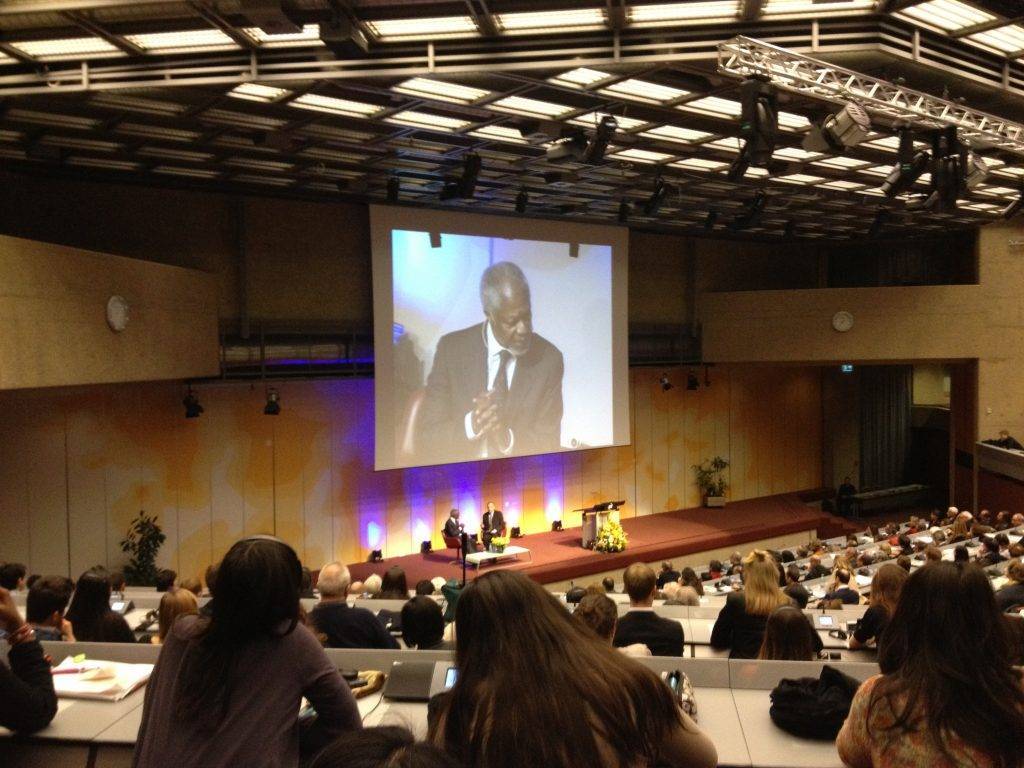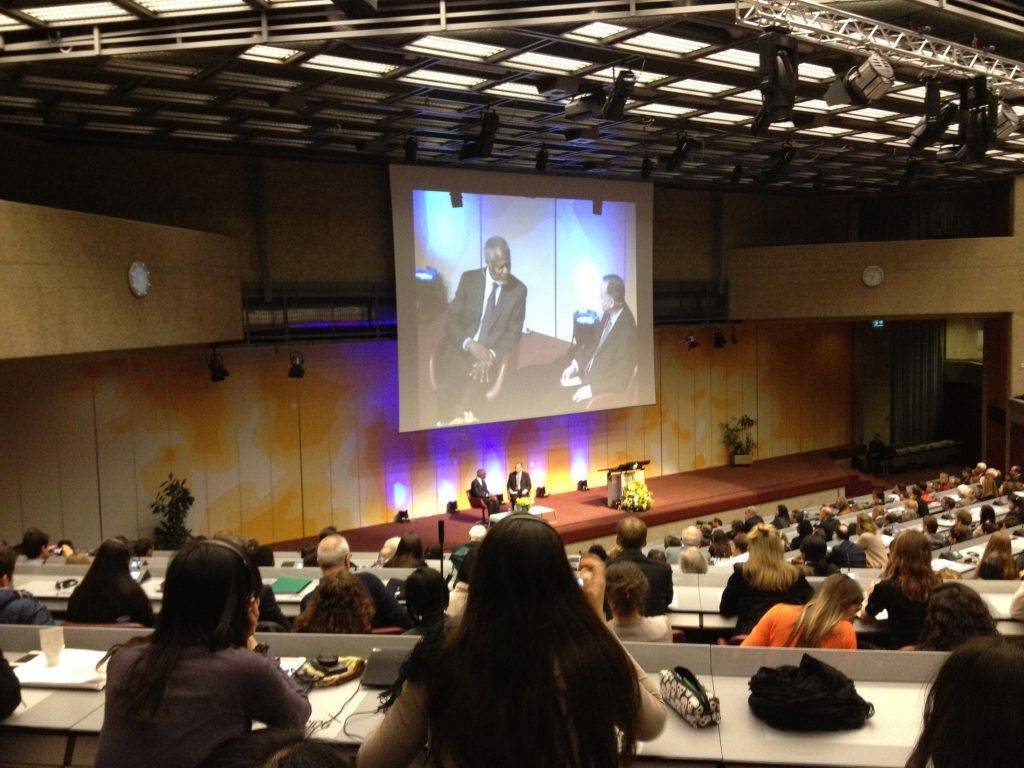One of the great things about living in Geneva is the variety of interesting people who visit the city. A little over a month ago, I was able to take in a great lecture by Hans Rosling. (You can read my posts about the event here and here and here.)
Last week, I went to hear Kofi Annan, the former Secretary-General of the United Nations, speak at the Geneva Convention Centre. Annan has a foundation that is based in Geneva, but on this occasion, he was promoting his autobiography, Interventions: A Life in War and Peace.

Annan did not deliver a speech per se. Rather, the format was a conversation between Annan and Nicolas Michel, a Professor of International Law at the University of Geneva and the Graduate Institute of International and Development Studies. The two sat in chairs behind a low coffee table. Because the event was in a large auditorium, the organizers had a large screen on stage with a with close-up of the pair. (The pictures below at the event give a sense of the setup.)
Poised and thoughtful, Kofi Annan shared personal stories from his childhood in Ghana and fascinating insights into his tenure as Secretary-General. And, he reflected on both his successes and failures.
Reflections on this format
- The energy level is somewhat lower than when a single person stands alone on stage. Both people are sitting in comfortable chairs and each shares some of the burden.
- The format has a more personal and intimate feeling. This was perfect for someone of Kofi Annan’s stature who was there to reflect on some of the things that he has done.

- The event should be scripted, but with room for spontaneity. The interviewer and interviewee should meet beforehand to go over the topics and flow of the conversation. However, the interviewer should be prepared to delve into different issues raised by the interviewee in his responses. Preparation is especially important for the interviewer in order to be able to react in the moment.
- The topics covered should be of interest to the audience. It is always about the audience! As most of the people in the audience were university students and, I suspect, staff members of the United Nations and other International Organizations, the speaker and the topics covered were perfect for the occasion.
- A third party should introduce both the interviewee (the main attraction) and the interviewer (who plays an integral role). The same person, or someone else, should say a few words at the end to thank everyone. They did this at the event.
- Starting the interview with a personal question about the speaker is a nice touch. It allows the audience to see a less well known side of the person, but one which influences who they become. Kofi Annan shared some interesting and telling anecdotes about growing up in Ghana at the time of its independence. He also shared a humorous story about the time a man approached him in a small restaurant in northern Italy to ask for an autograph. The man turned out to be Morgan Freeman.
- The questions should not be too long. Some questions need a bit of background, and on the whole, Michel did a good job. But once or twice he spoke for too long and the point of the question became somewhat muddled.
- The interviewer and interviewee need to be careful not to step on each other’s words. In personal conversations, people frequently start talking while their companion is still finishing a thought. But in a formal setting, the interviewer and interviewee are having a personal conversation in front of (and for) an audience. They should avoid talking over each other. This happened a couple of times with Annan and Michel.
- A Q&A session with the audience complements this format nicely as it extends the conversation.
- Have water (room temperature and flat) and pen and paper on the table for the participants. The latter is especially important should the interviewer asked for several questions and then turn them all over to the interviewee (as was the case).
- Having the big screen behind Kofi Annan was most welcome. Unfortunately, there was a short lag between the sound and the picture, which was mildly annoying. Equipment checks are critical whatever the format of the speaking event.
Memorable lines from Kofi Annan
- In international relations, it is not always a question of legal niceties; there are also moral imperatives.
- When we are asked to give up our civil rights in return for protection, do we even have any rights left?

- There are times when the Secretary-General of the United Nations has to be a Secretary and there are times when he has to be a General.
- Governments cannot hide behind sovereignty and brutalize their own people. Some crimes are so shameful, disgraceful and unacceptable that we cannot sit back and do nothing.
- When leaders fail to lead, the people can make them follow.
- Governments cannot do everything; civil society can and must play an important role in bringing about necessary changes.
- There are times when you have to bring force to bear on issues of peace. However, if we look at war from a moral and ethical point of view, there is no winner.
- The fact that you cannot intervene everywhere does not mean that you cannot intervene anywhere.
- Human dignity is a fundamental right.
















2 Replies to “An Evening with Kofi Annan”
Preparation is important and I feel that allowing time to finish a thought and not “stepping on each others words” is very important. It gives not only respect but coveys that this message is important! Nice article!
Thanks, Ginger. Much appreciated.
The “stepping on each other’s words” only happened a couple of times and then, only for a few words. (I don’t want to give the impression that Annan and Michel were behaving like two friends having a drink in a bar!) But it was noticeable, at least to me.
Cheers!
John